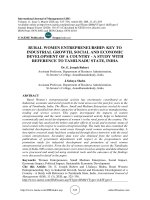Economic growth and economic development 673
Bạn đang xem bản rút gọn của tài liệu. Xem và tải ngay bản đầy đủ của tài liệu tại đây (87.21 KB, 1 trang )
Introduction to Modern Economic Growth
globalization to affect the types of technologies that are being developed
and used?
We can provide answers to these questions and develop a framework of directed
technological change by extending the ideas we have studied in the past few chapters.
The main insight is to think of profit incentives as affecting not only the amount
but also the direction of technological change. Before presenting detailed models,
let us review the basic arguments, which are quite intuitive.
Imagine an economy which has two different factors of production, say L and
H (corresponding to unskilled and skilled workers), and two different types of technologies that can complement either one or the other factor. We would expect that
whenever the profitability of H—complementary technologies is greater than the
L-complementary technologies, more of the former type will be developed by profitmaximizing (research) firms. But then, what determines the relative profitability
of developing different technologies? The answer to this question summarizes most
of the economics in the models of directed technological change. Two potentially
counteracting effects shape the relative profitabilities of different types of technologies:
(1) The price effect: there will be stronger incentives to develop technologies
when the goods produced by these technologies command higher prices.
(2) The market size effect: it is more profitable to develop technologies that
have a larger market, for the reasons discussed in Chapter 12 and previously
emphasized by Jacob Schmookler (1966), who wrote:
“invention is largely an economic activity which, like other economic
activities, is pursued for gain;... expected gain varies with expected sales
of goods embodying the invention.”
We will see that this market size effect will be powerful enough to outweigh the
price effect. In fact, our analysis will show that under fairly general conditions the
following two results will hold:
659









